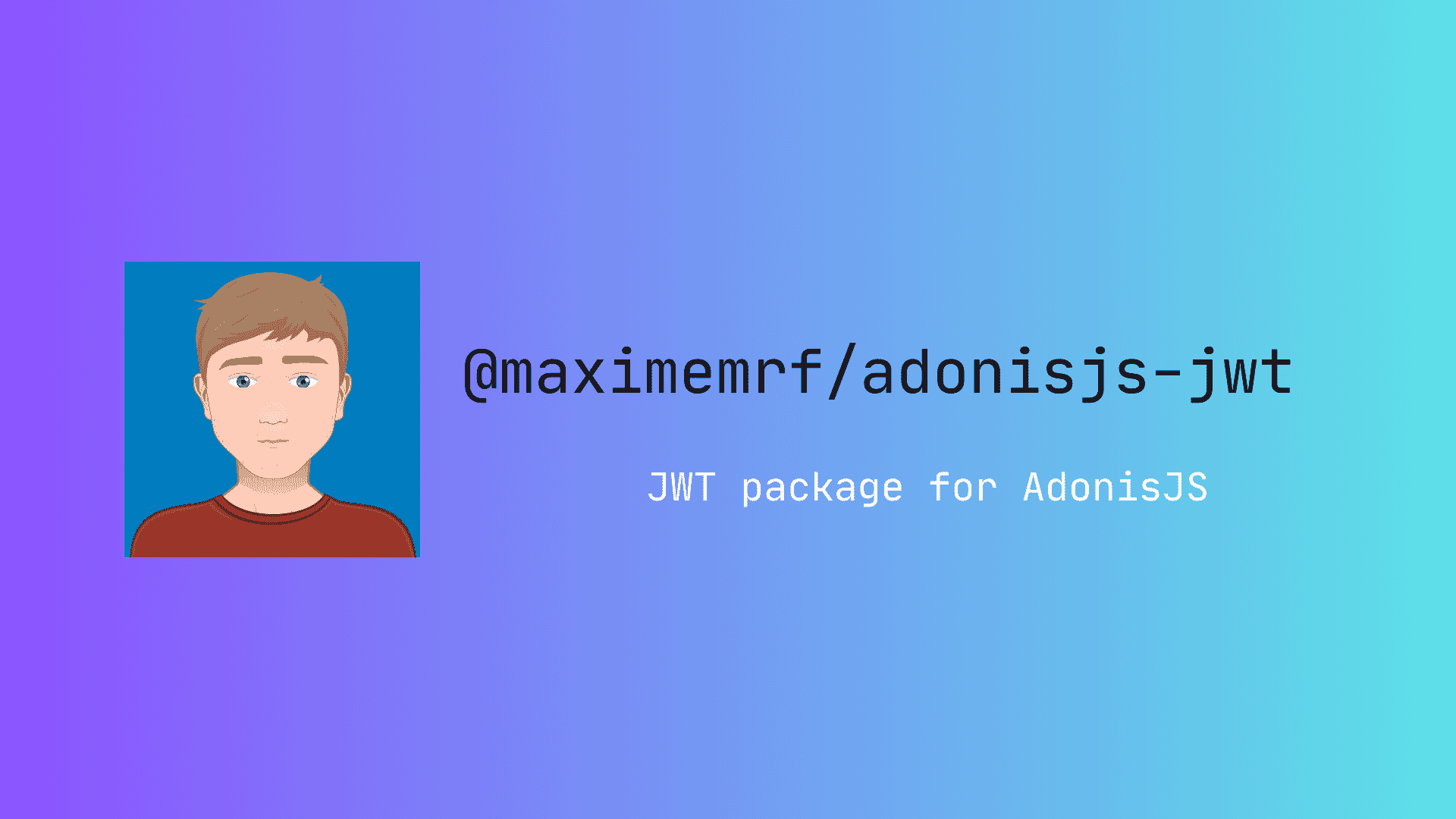
AdonisJS package to authenticate users using JWT tokens.
Prerequisites
You have to install the auth package from AdonisJS
node ace add @adonisjs/auth
Setup
Install the package:
npm i @maximemrf/adonisjs-jwt
Usage
Go to config/auth.ts and add the following configuration:
import { defineConfig } from '@adonisjs/auth'
import { InferAuthEvents, Authenticators } from '@adonisjs/auth/types'
import { sessionGuard, sessionUserProvider } from '@adonisjs/auth/session'
import { tokensUserProvider } from '@adonisjs/auth/access_tokens'
import { jwtGuard } from '@maximemrf/adonisjs-jwt/jwt_config'
import { JwtGuardUser, BaseJwtContent } from '@maximemrf/adonisjs-jwt/types'
import User from '#models/user'
import env from '#start/env'
interface JwtContent extends BaseJwtContent {
email: string
}
const authConfig = defineConfig({
// define the default authenticator to jwt
default: 'jwt',
guards: {
web: sessionGuard({
useRememberMeTokens: false,
provider: sessionUserProvider({
model: () => import('#models/user'),
}),
}),
// add the jwt guard
jwt: jwtGuard({
// tokenName is the name of the token passed as cookie, it can be optional, by default it is 'token'
tokenName: 'custom-name',
// tokenExpiresIn can be a string or a number, it can be optional
tokenExpiresIn: '1h',
// if you want to use cookies for the authentication instead of the bearer token (optional)
useCookies: true,
// secret is the secret used to sign the token, it can be optional, by default it uses the application key
// you can use a env variable like JWT_SECRET or set it directly with a string
// if you don't have specific needs, please discard this option
secret: env.get('JWT_SECRET'),
provider: sessionUserProvider({
model: () => import('#models/user'),
}),
// if you want to use refresh tokens, you have to set the refreshTokenUserProvider
refreshTokenUserProvider: tokensUserProvider({
tokens: 'refreshTokens',
model: () => import('#models/user'),
}),
// optionally set the expiry for the refresh token
refreshTokenExpiresIn: '7d',
// ability to separate cookie usage for refresh token
useCookiesForRefreshToken: true,
// limit the abilities of the refresh token
refreshTokenAbilities: ['refresh_token'],
// content is a function that takes the user and returns the content of the token, it can be optional, by default it returns only the user id
content: <T>(user: JwtGuardUser<T>): JwtContent => {
return {
userId: user.getId(),
email: (user.getOriginal() as User).email,
}
},
}),
},
})
tokenName is the name of the jwt token passed as a cookie, it can be optional, by default it is token.
tokenName: 'custom-name'
tokenExpiresIn is the time before the jwt token expires it can be a string or a number and it can be optional.
// string
tokenExpiresIn: '1h'
// number
tokenExpiresIn: 60 * 60
You can also use cookies for the authentication instead of the bearer token by setting useCookies to true.
useCookies: true
If you just want to use jwt with the bearer token no need to set useCookies to false you can just remove it.
JWKS
You can use JWKS to verify the token by setting the jwks option in the guard configuration.
// ...
jwt: jwtGuard({
// ...
jwks: {
jwksUri: 'https://your-auth-server/.well-known/jwks.json',
// you can pass any options accepted by jwks-rsa package
cache: true,
rateLimit: true,
},
}),
// ...
[!WARNING] If you enable JWKS, you cannot use the
auth.use('jwt').generate(user)andauth.use('jwt').generateWithRefreshToken()method because the token is signed by an external provider. You can only use theauthenticate(orcheck/getUserOrFail) method to verify the token.
Refresh Tokens
To use refresh tokens, you have to set the refreshTokenUserProvider in the guard configuration, see the example above.
Create a new AdonisJS migration file and run it to create the jwt_refresh_tokens table:
import { BaseSchema } from '@adonisjs/lucid/schema'
export default class extends BaseSchema {
protected tableName = 'jwt_refresh_tokens'
async up() {
this.schema.createTable(this.tableName, (table) => {
table.increments()
table
.integer('tokenable_id')
.notNullable()
.unsigned()
.references('id')
.inTable('users')
.onDelete('CASCADE')
table.string('type').notNullable()
table.string('name').nullable()
table.string('hash', 80).notNullable()
table.text('abilities').notNullable()
table.timestamp('created_at', { precision: 6, useTz: true }).notNullable()
table.timestamp('updated_at', { precision: 6, useTz: true }).notNullable()
table.timestamp('expires_at', { precision: 6, useTz: true }).nullable()
table.timestamp('last_used_at', { precision: 6, useTz: true }).nullable()
})
}
async down() {
this.schema.dropTable(this.tableName)
}
}
And add the refreshTokens property to your User model:
import { column, BaseModel } from '@adonisjs/lucid/orm'
import { DbAccessTokensProvider } from '@adonisjs/auth/access_tokens'
export default class User extends BaseModel {
@column({ isPrimary: true })
declare id: number
@column()
declare username: string
@column()
declare email: string
@column()
declare password: string
static refreshTokens = DbAccessTokensProvider.forModel(User, {
prefix: 'rt_',
table: 'jwt_refresh_tokens',
type: 'jwt_refresh_token',
tokenSecretLength: 40,
})
}
Authentication
To make a protected route, you have to use the auth middleware with the jwt guard.
router.post('login', async ({ request, auth }) => {
const { email, password } = request.all()
const user = await User.verifyCredentials(email, password)
// to generate a token (and refresh token if configured)
// this returns { type, token, expiresIn, refreshToken, refreshTokenExpiresIn }
// if useCookies is true, it sets cookies on the response instead
return await auth.use('jwt').generate(user)
})
// if the jwt guard is the default guard
router
.get('/', async ({ auth }) => {
return auth.getUserOrFail()
})
.use(middleware.auth())
// if the jwt guard is not the default guard
router
.get('/', async ({ auth }) => {
return auth.use('jwt').getUserOrFail()
})
.use(middleware.auth({ guards: ['jwt'] }))
// if you use the refresh token
router.post('jwt/refresh', async ({ auth }) => {
// this will authenticate the user using the refresh token
// it will delete the old refresh token and generate a new one
// it accepts an optional refresh token, otherwise it looks in:
// 1. request body 'refreshToken'
// 2. cookies (if enabled)
// 3. Authorization header
return await auth.use('jwt').generateWithRefreshToken()
})
// to logout (revoke refresh token)
router.post('logout', async ({ auth }) => {
await auth.use('jwt').revoke()
return { message: 'Logged out' }
})
Security
We use natively the AdonisJS application key to sign the token, so you don't have to worry about it and avoid this.



